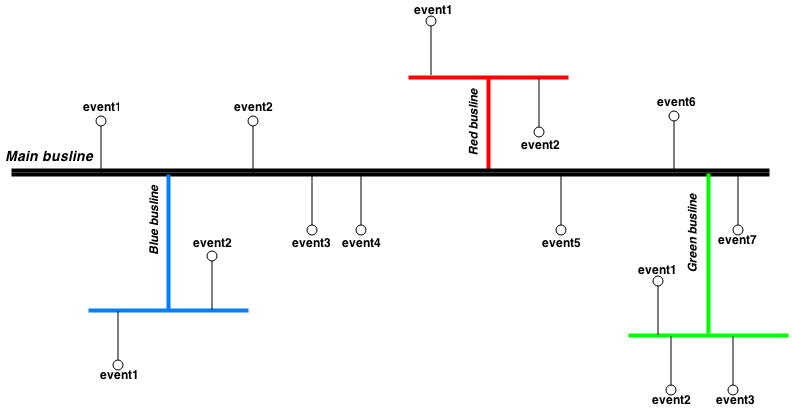hermes-bus
v2.2.10
Published
Powerful event-emitter module for responsive bus architecture applications
Downloads
40
Maintainers
Readme

hermes-bus
Powerful event-emitter module for responsive bus architecture applications.
Features
- Multiple namespaces through custom buslines
- Asynchronous event handling
- Before/After event hooks
Install
Install with npm:
$ npm install hermes-busUse
var bus = require("hermes-bus");Multiple namespaces
The hermes-bus has a main "busline". On that "busline" we can register/trigger events and even create new "buslines" which in turn can be used to register/trigger other events.

Events on the main "busline"
//Register event "start" on the main "busline"
bus.subscribe({
onStart: function(arg0..argN){
...
}
});All the functions in the subscribed object which have a name with the 'on' prefix are automatically attached on the bus. No need to publish them.
In order to trigger a subscribed function we need to call bus.trigger + "eventName"(arg0..argN) or bus.trigger("start", arg0..argN).
For example, we can trigger the "start" event on the main "busline" by calling:
//"start" event is already registered on the main "busline"
bus.triggerStart("foo", "bar");or
//"start" event is already registered on the main "busline"
bus.trigger("start", "foo", "bar");Note that the event name is camelCased when we use the generated function and always starts with a lower case letter when we use the trigger(string) approach!
Events on custom "buslines"
Hermes-bus gives the flexibility of creating your own "buslines". This allows us to create different namespaces which will make our code more readable and also increase the performance of the bus.
Lets say that we want to create a busline that will handle database utilities.
//Registers event "save" on the db "busline"
bus.subscribe("db", {
onSave: function(entry){
...
}
});The above code creates the "db busline" and attaches the "save" event on it.
bus.db.triggerSave(entry);This event is not accessible from the main "busline" so if you register another "save" event on the main or another custom "busline" it will be a completely different event.
Asynchronous event handling
When subscribing asynchronous events we don't have any control on when the callbacks that are attached on the event will return. Everything is asynchronous.
Example
//Module1.js
bus.subscribe({
onAsync: function(msg){
setTimeout(function(){
console.log(msg, "Module1.js");
}, 1000);
}
}); //Module2.js
bus.subscribe({
onAsync: function(msg){
setTimeout(function(){
console.log(msg, "Module2.js");
}, 2000);
}
});In the example above we attach two asynchronous callback functions on the "async" event.
If we execute below code:
//Module3.js
var msg = "trigger event 'async' in ";
bus.triggerAsync(msg);
console.log("all callbacks finished");we will get :
$ all callbacks finished
$ trigger event 'async' in Module1.js
$ trigger event 'async' in Module2.js If we want to guarantee that all asynchronous callbacks attached to an event has been executed and then execute some code that depends on the state that the triggered event created, we need to "resolve" that event.
In order to define which events are going to be handled as asynchronous we need to give the "__on" prefix in a subscribed function.
When triggering an event, all functions that are subscribed using the '__on' prefix automatically are invoked with an additional argument. This argument is always the last one and is used to define when the asynchronous event is executed. We need to invoke that callback inside the "onDone" function of our asynchronous code in order to let hermes-bus know that this event was resolved.
Example
//Module1.js
bus.subscribe({
__onAsync: function(msg, resolve){
setTimeout(function(){
console.log(msg, "Module1.js");
resolve();
}, 1000);
}
});
//Module2.js
bus.subscribe({
__onAsync: function(msg, resolve){
setTimeout(function(){
console.log(msg, "Module2.js");
resolve();
}, 2000);
}
}); //Module3.js
var msg = "resolved event 'async' in ";
bus.triggerAsync(msg).then(function(){
console.log("all callbacks finished");
});we will get :
$ resolved event 'async' in Module1.js
$ resolved event 'async' in Module2.js
$ all callbacks finished We can subscribe asynchronous and synchronous events under the same event name. All the subscribed functions that have the "__on" prefix will be executed first and then, and only then, the .then() function will be invoked. Only requirement is to call these events with the same number of arguments and make sure that the "resolve()" function is invoked inside the "onDone" asynchronous callbacks.
Before/After event hooks
Hermes-bus provides "before" and "after" hooks for every subscribed event. These hooks, if specified, are triggered automatically by the bus.
// Module1.js
bus.subscribe({
beforeFoo: function(msg){
console.log("Module1: Before hook says", msg);
},
onFoo: function(msg){
console.log("Module1: Foo event says", msg);
},
afterFoo: function(msg){
console.log("Module1: After hook says", msg);
}
});//Module2.js
bus.subscribe({
beforeFoo: function(msg){
console.log("Module2: Before hook says", msg);
},
onFoo: function(msg){
console.log("Module2: Foo event says", msg);
},
afterFoo: function(msg){
console.log("Module2: After hook says", msg);
}
});As we can see the naming convention is self explanatory.
In order to create a "before" for the event "foo", we need to specify the "beforeFoo" function in the subscribed object. Same for the "after" hooks.
If we execute below code
bus.triggerFoo("'hi'.");we will get :
$ Module1: Before hook says 'hi'.
$ Module2: Before hook says 'hi'.
$ Module1: Foo event says 'hi'.
$ Module2: Foo event says 'hi'.
$ Module1: After hook says 'hi'.
$ Module2: After hook says 'hi'.All "before" hooks will be executed before the "foo" event and after that the "after" hooks will follow.
If we want to handle asynchronous code in our hooks, then we can use the "__" prefix as we do with normal event listeners (e.g __beforeFoo, __afterFoo). This works the same way as for regular subscribed event listeners. (check Asynchronous event handling section)
API
bus.subscribe(busline, registeredObject): Subscribes an object with listeners on a busline.busline: (optional) Defines the busline on which the object will be subscribed. (By default uses main "busline").registeredObject: Object that holds the listener functionsbus.unsubscribe(busline, registeredObject): Unregisters an object with listeners from a busline.busline: (optional) Defines the busline on which the event will be unsubscribed. (By default uses main "busline").registeredObject: Object that holds the listener functionsbus.disable(eventName): Disables a subscribed event on a busline.eventName: The event to disable.scope: All "buslines".bus.enable(eventName): Enables a subscribed event on a busline.eventName: The event to enable.scope: All "buslines".bus.hasEvent(eventName): Checks if an event is subscribed on a busline.eventName: The event under check.scope: All "buslines".bus[busline].destroy(): Destroys custom busline.scope: Custom "buslines" only.bus.reset(): Resets main "busline". This doesn't affect subscribed custom "buslines".scope: Main "busline".bus.hardReset(): Resets main "busline" and destroys all subscribed custom "buslines".scope: Main "busline".bus.require(basePath, [...modulePaths]): Loads modules and registers their events in the specified order.basePath: (optional) Module paths are relative to this path. If not provided it defaults to current working directory.[module0,..,moduleN]: Module paths relative to basePath.scope: Main "busline".
Test
Run the tests
$ npm testLicense
Copyright (c) 2014 Ioannis Tzanellis Released under the MIT license



